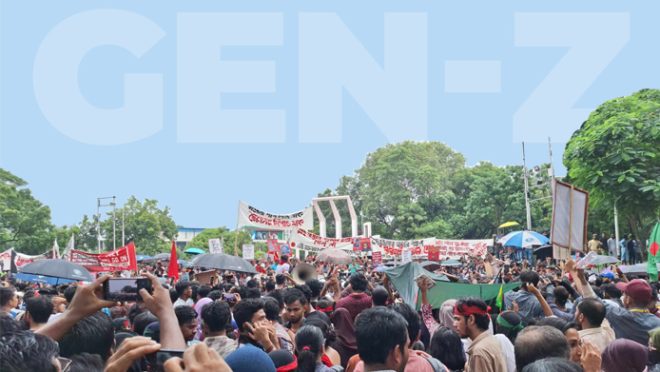The future is now: How Bangladesh's Gen-Z is revolutionising change through activism
The future is now: How Bangladesh's Gen-Z is revolutionising change through activism

A revolution that began on the streets of Bangladesh culminated to the fall of the Awami League government who had been in power for long 15 years. Who made the change possible? Say hello to Gen-Z, the fearless and bold youth leading the change. They are redefining what activism looks like with their courage and determination.
From online to the battlefield
The quota reform movement cleared the ground for the establishment of a new way of thinking while fighting against injustice. It began peacefully but was met with brutal force from the government and allied forces. On 16 July, 25-year-old Abu Sayeed was killed by police shooting in Bogura. This sparked a fire that drew hundreds and thousands of students across the country onto the streets. Educators, lawyers, parents and rickshaw pullers joined them in solidarity, in anger and mourning over the death of Sayeed and hundreds of others. Nights were restless while days were passed in fear of death news.
It was a complete uprising, both digital and physical. There was a broadband internet blackout from 18 to 24 July while mobile internet was disrupted from 18 to 28 July.
The students poured onto the streets, defying water cannons, tear gas, and violent crackdowns with unwavering resolve. Bangladeshi Gen-Zs were armed with smartphones, a mission, and the will to fight, they took to social media to spread their message.
The hashtags and live streams were their battle cries, while the real battles were fought on the ground. Their sacrifices turned into powerful symbols of hope and justice, inspiring many more to join the movement and stand up against injustice. The fervent fury of Gen-Zs, with their unique vocabulary and a love for making memes, has evolved into a commitment to build a better Bangladesh. The “rizz” is now working for their country no cap.
Courage in action
What’s truly inspiring is how this activism sparked a wave of courage. Seeing their peers bravely confront oppression, others were emboldened to join the cause. It wasn’t just about one issue; it was about creating a culture where speaking out is the norm.
The Shahbagh area, known for its historical significance in movements, was buzzing with energy once again. The 1952 Language Movement served as a true inspiration for them. They tapped into the courage passed down through generations, instilling in them the idea that they can make a difference. Gen-Z drew strength from their history, knowing that raising their voices and speaking out against wrongs is in their blood. They demonstrated that you don’t have to accept what you don’t agree with; you can challenge it and fight for change.
Global support and solidarity
This movement has far-reaching influence beyond the borders of Bangladesh. People of Bangladeshi descent living abroad showed strong support by protesting in their host countries and spreading the news through international channels. They organised rallies, vigils, and awareness campaigns, ensuring that the world knew about the struggles and sacrifices being made back home.
The global spotlight helped intensify the push for change showing that the fight for a better Bangladesh resonated all throughout.
Remembering the heroes
As we celebrate these achievements, it’s crucial to honour those who made the ultimate sacrifice. From the beginning, students have remembered these martyrs from the bottom of their hearts. Their courage and dedication paved the way for this change.
The names of those who lost their lives constantly resonated throughout the protests: Abu Sayeed, Mir Mugdha, Jahiduzzaman Tanvin, Sheikh Fahim Zafar, Farhan Faiyaz, Faysal Ahmed, Md Shahjahan, were among the many unknown heroes. These individuals, who fought till their last breath, brought students to the streets and inspired a nation.
Journalists worked diligently to capture the reality of the movement, providing accurate information and spreading it widely. Their dedication to truth and transparency was crucial in informing and mobilising the public. Meanwhile, creatives used arts, writings as powerful tools, sharing well-informed content and help was a duty for them. Also, their relentless effort in digging deep to uncover the genuine offenders were remarkable.
Tangible impact
The impact of this movement is real. Policies are being re-evaluated, and new perspectives are being considered in governance. But more than that, a mindset shift is happening. Gen-Z is teaching everyone that change doesn’t come from waiting—it comes from doing. Perhaps in 20 years or so, people will read about this generation’s will to battle for rights and strive for improvement. This will encourage them to find voice and patriotism.
All eyes on Gen-Z
With hope and anticipation, all eyes are on Gen-Z to build something big, different, positive, and evergreen. As we witness this generation’s transformative impact, we remain hopeful and I feel grateful and proud to be a part of this generation. The future is indeed now. After all, we’re not just changing the game, we’re rewiring it for real.


